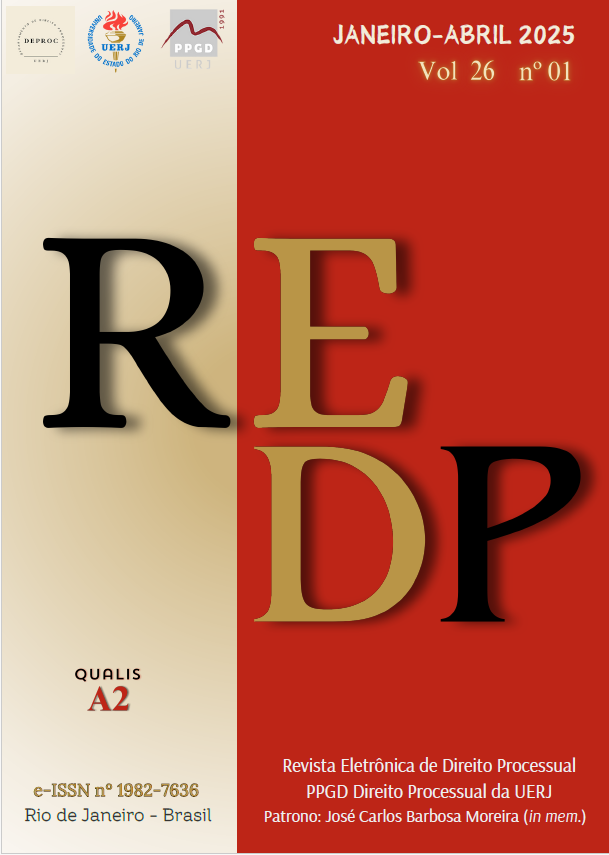O TRÂNSITO DE TÉCNICAS DOS PROCESSOS DE RECUPERAÇÃO JUDICIAL PARA A EXECUÇÃO A PARTIR DA NEGOCIAÇÃO PROCESSUAL
DOI:
https://doi.org/10.12957/redp.2025.88853Resumo
O ordenamento jurídico processual brasileiro, disciplinado, especialmente, pelo Código de Processo Civil, dispõe sobre o procedimento comum, aplicável, de modo geral, a ações ordinárias e de forma subsidiária a outras espécies de ações, e, para além disso, dispõe sobre procedimentos especiais, previstos também na legislação específica, a exemplo daquele previsto na Lei de Recuperação Judicial e Falência de empresas. Por consequência, o ordenamento jurídico processual, seja pelo CPC, seja pela legislação específica, também disciplina técnicas processuais comuns e especiais, aplicáveis em cada um dos procedimentos para os quais o legislador teve o intento de criar a respectiva técnica. Ocorre que, dado o caráter consensual trazido ao processo civil pelo Código de Processo Civil de 2015, em especial por meio da previsão expressa sobre a celebração de negócios jurídicos processuais, admite-se, atualmente, a flexibilização de procedimentos, por meio do trânsito de técnicas de um procedimento para o outro. Isso porque, embora o legislador não tenha previsto uma determinada técnica para um procedimento específico, esta pode se demonstrar útil e compatível com os objetivos deste procedimento. Assim, a flexibilização por meio do trânsito de técnicas procedimentais originariamente previstas na lei para procedimentos específicos consiste em método capaz de garantir maior eficácia à tutela jurisdicional. Exemplo de procedimento que pode receber técnicas processuais consiste no processo executivo, sob o fundamento de que este processo necessita maior efetividade e celeridade em prol do credor. O presente artigo analisa, assim, as condições para celebração de negócios jurídicos processuais voltados ao trânsito de técnicas processuais da Lei de Recuperação Judicial e Falências para o processo executivo, e exemplifica técnicas previstas na lei e sua aplicabilidade no processo executivo. A análise demonstra que a absorção de técnicas oriundas do processo de recuperação judicial e falências pode conferir maior efetividade à busca do credor pela satisfação de seu crédito.
Downloads
Publicado
Como Citar
Edição
Seção
Licença
Copyright (c) 2024 Marcela Kohlbach de Faria, Caroline Christyne Goebel

Este trabalho está licenciado sob uma licença Creative Commons Attribution 4.0 International License.
Todos os artigos publicados na Revista Eletrônica de Direito Processual (REDP) (Departamento de Direito Processual, Universidade do Estado do Rio de Janeiro, Brasil) são licenciados por meio de uma Licença Creative Commons - Atribuição 4.0 Internacional (CC BY 4.0).
Os autores retêm os direitos autorais de seu artigo e concordam em licenciar seu trabalho com a licença CC BY 4.0, aceitando assim os termos e condições específicos desta licença disponíveis no seguinte website: https://creativecommons.org/licenses/by/4.0/legalcode.
- Os autores concedem à REDP o direito de primeira publicação, de se identificar como publicadora original do trabalho e concedem à revista uma licença de direitos não exclusivos para utilizar o trabalho das seguintes formas: Reproduzir, vender e distribuir cópias eletrônicas ou impressas do manuscrito como um todo, de partes específicas do manuscrito e de suas traduções para qualquer idioma;
- O uso do artigo por terceiros é livre, contanto que a integridade da publicação seja mantida e seus autores originais, periódico de primeira publicação e detalhes de citação sejam identificados.
Dentro dos termos da licença, os autores podem entrar em acordos contratuais adicionais separados para a distribuição não exclusiva da versão publicada do trabalho na revista.
Copyright and Licensing
All articles published in the Procedural Law Electronic Review (REDP) (Department of Procedural Law, State University of Rio de Janeiro, Brazil) are licensed under a Creative Commons License - Attribution 4.0 International (CC BY 4.0).
- Authors retain copyright to their article and agree to license their work under the CC BY 4.0 license, thereby accepting the specific terms and conditions of this license available at the following website: https://creativecommons.org/licenses/by/4.0/ legal code.
- Authors grant REDP the right of first publication, to identify itself as the original publisher of the work, and grant the journal a non-exclusive license to use the work in the following ways: Reproduce, sell and distribute electronic or printed copies of the manuscript as a whole, of specific parts of the manuscript and its translations into any language;
- Use of the article by third parties is free, as long as the integrity of the publication is maintained and its original authors, first publication journal, and citation details are identified.
Within the terms of the license, authors may enter into separate additional contractual agreements for the non-exclusive distribution of the published version of the work in the journal.




